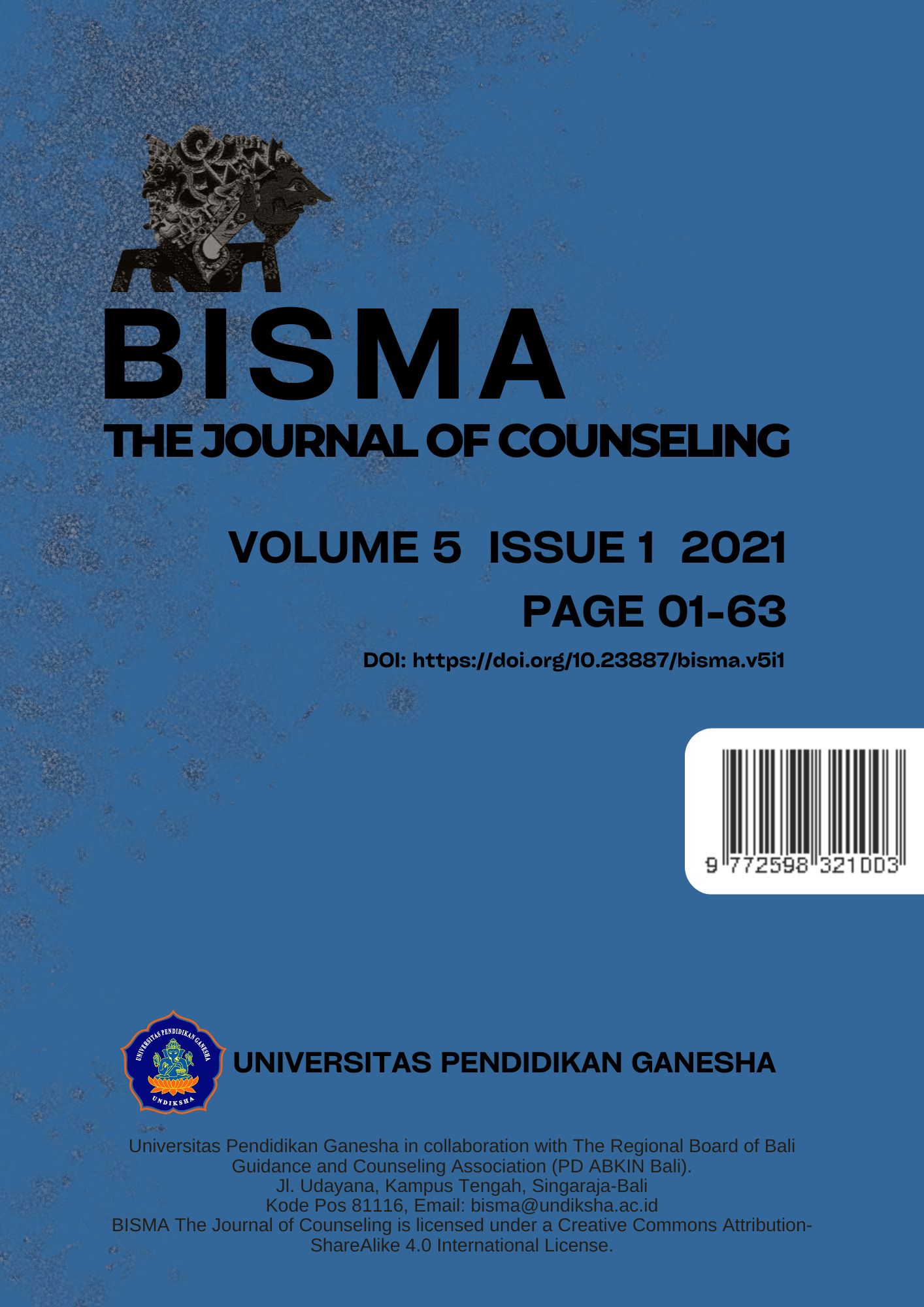The Effectiveness of Behavioral Counseling with Modeling Techniques to Improve Student Self-Achievement
DOI:
https://doi.org/10.23887/bisma.v5i1.33926Keywords:
Behavioral Counseling, Modeling, Self AchievementAbstract
This study aims to determine the difference between before and after treatment and to determine the effect of behavioral counseling with modeling techniques to improve student self-achievement. The research was conducted at SMK Negeri 1 Singaraja in class X, and used a randomized controlled trial (RCT) research design. Sampling in this study through simple random sampling which took 2 research samples, namely the experimental and control classes. The results of this study indicate the influence of behavioral counseling with modeling techniques to increase self-achievement through the effect size test. Based on these results, the researcher recommends behavioral counseling with modeling techniques to increase self-achievement in school.References
Acquah, A. (2017). Implications of the Achievement Motivation Theory for School Management in Ghana : A Literature Review Implications of the Achievement Motivation Theory for School Management in Ghana : A Literature Review, 7 (5)(2224–5766), 10–14. Retrieved from https://www.researchgate.net/publication/316672421_Implications_of_the_Achievement_Motivation_Theory_for_School_Management_in_Ghana_A_Literature_Review/link/590b62cda6fdcc5d421ed1c6/download
Dharsana, I. K. (2019). Cognitive Counseling with Reframing Techniques to Intervene in Self Aggression. In Advances in Social Science, Education and Humanities Research (Vol. 382, pp. 62–64). Retrieved from https://www.mendeley.com/search/?query=Cognitive Counseling with Reframing Techniques to Intervene in Self Aggression&adobe_mc_sdid=SDID%3D0074CB94C27FDBBC-3851BBCAA435435A%7CMCORGID%3D4D6368F454EC41940A4C98A6%40AdobeOrg%7CTS%3D1594390868&adobe_mc_ref=https%3A%2F%2Fwww.mendeley.com%2Fnewsfeed%3Fsearch%3Dresearch-papers
Dharsana, I. K., Paramartha, W. E., & Sudarsana, G. N. (2018). Honest Development Characters Which Are Karma Phala Values. In International Conference on Technology and Educational Science. https://doi.org/10.4108/eai.21-11-2018.2282217
Dharsana, I. K., Suarni, N. K., Sudarsana, G. N., Paramartha, W. E., & Mardiana, A.-B. T. counseling in developing C.-G. F. in adolescents. pdf. (2019). Cognitive-Behavioral Therapy Counseling in Developing Cross-Gender Friendship in Adolescents. Enfermeria Clinica, 30 (2), 206–208. Retrieved from https://www.sciencedirect.com/science/article/abs/pii/S1130862119304322?via%3Dihub
Dharsana, K. (2017). Teori-teori Konseling. Singaraja: Undiksha Press.
Imran, A., Suarni, N. K., & Darsana, I. K. (2019). Effectiveness of Behavior Conservation with Technical Modeling Through Lesson Learning to Increase Fun Characters for Others. Global Conferences Series : Sciences and Technology (GCSST), 1, 1–5. https://doi.org/10.32698/401
Jadad, A. R. (1998). Randomised Controlled Trials. London: BMJ Books.
Mahendra, I. A., Darsana, I. K., & Suarni, N. K. (2019). The Effectiveness of Behavioral Concept With Modeling Techniques to Improve Self Nurturance. Bisma The Journal of Counseling, 3(1), 18–24. https://doi.org/10.24036/18
Nabavi, R. T. (2014). Bandura’s Social Learning Theory & Social Cognitive Learning Theory. Reseachgate, (January 2012). Retrieved from https://www.researchgate.net/publication/267750204_Bandura’s_Social_Learning_Theory_Social_Cognitive_Learning_Theory
Paramartha, W. E., Dharsana, I. K., & Suarni, N. K. (2017). Gestalt Counseling with Dialog Game Techniques and Hipno Counseling Techniques for Self Achievement Pendahuluan. Bicma The Journal of Counseling, 1(1), 39–49. https://doi.org/10.23887/128322017
Skinner, B. F. (1976). About Behaviorism. New York: Vintage Books. Retrieved from https://b-ok.cc/book/2647463/9445c7
Zhou, M., College, D. S., Brown, D., & College. (2015). Educational Learning Theories : 2nd Edition Educational Learning Theories. Retrieved from https://oer.galileo.usg.edu/cgi/viewcontent.cgi?article=1000&context=education-textbooks









